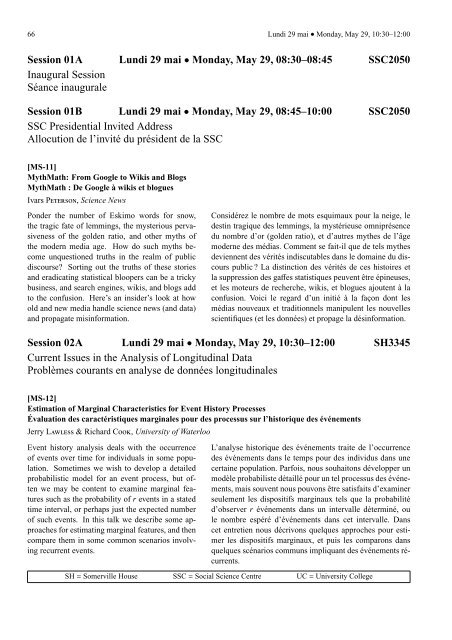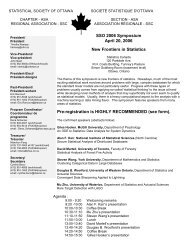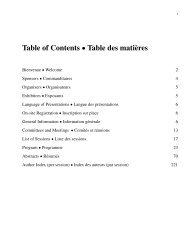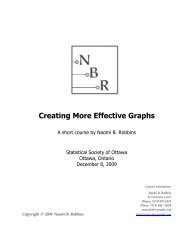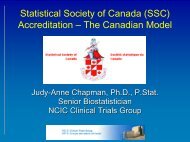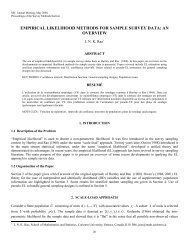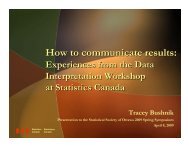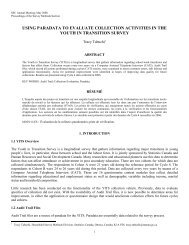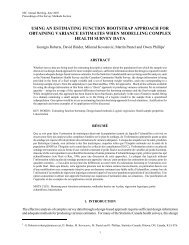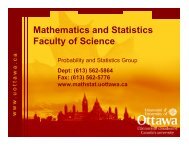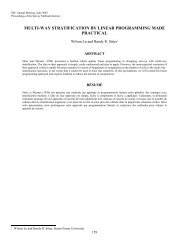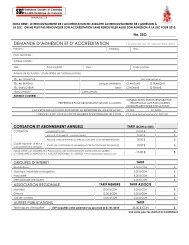Programme et résumés (pdf) - Société statistique du Canada
Programme et résumés (pdf) - Société statistique du Canada
Programme et résumés (pdf) - Société statistique du Canada
You also want an ePaper? Increase the reach of your titles
YUMPU automatically turns print PDFs into web optimized ePapers that Google loves.
66 Lundi 29 mai • Monday, May 29, 10:30–12:00Session 01A Lundi 29 mai • Monday, May 29, 08:30–08:45 SSC2050Inaugural SessionSéance inauguraleSession 01B Lundi 29 mai • Monday, May 29, 08:45–10:00 SSC2050SSC Presidential Invited AddressAllocution de l’invité <strong>du</strong> président de la SSC[MS-11]MythMath: From Google to Wikis and BlogsMythMath : De Google à wikis <strong>et</strong> bloguesIvars PETERSON, Science NewsPonder the number of Eskimo words for snow,the tragic fate of lemmings, the mysterious pervasivenessof the golden ratio, and other myths ofthe modern media age. How do such myths becomeunquestioned truths in the realm of publicdiscourse? Sorting out the truths of these storiesand eradicating statistical bloopers can be a trickybusiness, and search engines, wikis, and blogs addto the confusion. Here’s an insider’s look at howold and new media handle science news (and data)and propagate misinformation.Considérez le nombre de mots esquimaux pour la neige, ledestin tragique des lemmings, la mystérieuse omniprésence<strong>du</strong> nombre d’or (golden ratio), <strong>et</strong> d’autres mythes de l’âgemoderne des médias. Comment se fait-il que de tels mythesdeviennent des vérités indiscutables dans le domaine <strong>du</strong> dis-cours public ? La distinction des vérités de ces histoires <strong>et</strong>la suppression des gaffes <strong>statistique</strong>s peuvent être épineuses,<strong>et</strong> les moteurs de recherche, wikis, <strong>et</strong> blogues ajoutent à laconfusion. Voici le regard d’un initié à la façon dont lesmédias nouveaux <strong>et</strong> traditionnels manipulent les nouvellesscientifiques (<strong>et</strong> les données) <strong>et</strong> propage la désinformation.Session 02A Lundi 29 mai • Monday, May 29, 10:30–12:00 SH3345Current Issues in the Analysis of Longitudinal DataProblèmes courants en analyse de données longitudinales[MS-12]Estimation of Marginal Characteristics for Event History ProcessesÉvaluation des caractéristiques marginales pour des processus sur l’historique des événementsJerry LAWLESS & Richard COOK, University of WaterlooEvent history analysis deals with the occurrenceof events over time for indivi<strong>du</strong>als in some population.Som<strong>et</strong>imes we wish to develop a d<strong>et</strong>ailedprobabilistic model for an event process, but oftenwe may be content to examine marginal featuressuch as the probability of r events in a statedtime interval, or perhaps just the expected numberof such events. In this talk we describe some approachesfor estimating marginal features, and thencompare them in some common scenarios involvingrecurrent events.L’analyse historique des événements traite de l’occurrencedes événements dans le temps pour des indivi<strong>du</strong>s dans unecertaine population. Parfois, nous souhaitons développer unmodèle probabiliste détaillé pour un tel processus des événe-ments, mais souvent nous pouvons être satisfaits d’examinerseulement les dispositifs marginaux tels que la probabilitéd’observer r événements dans un intervalle déterminé, oule nombre espéré d’événements dans c<strong>et</strong> intervalle. Dansc<strong>et</strong> entr<strong>et</strong>ien nous décrivons quelques approches pour esti-mer les dispositifs marginaux, <strong>et</strong> puis les comparons dansquelques scénarios communs impliquant des événements récurrents.SH = Somerville House SSC = Social Science Centre UC = University College


